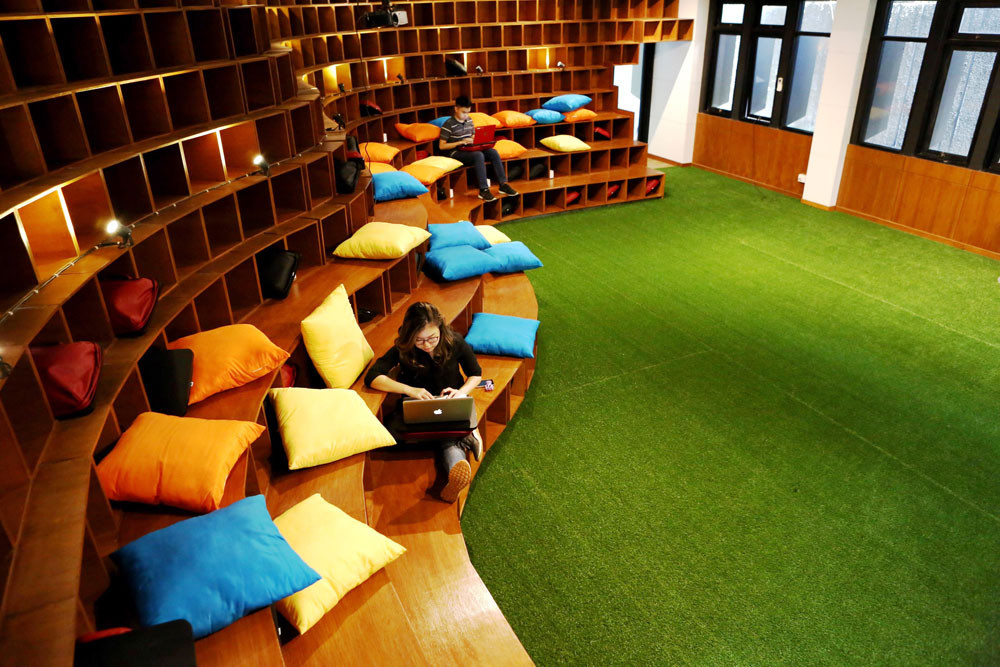Popular Reads
Top Results
Can't find what you're looking for?
View all search resultsPopular Reads
Top Results
Can't find what you're looking for?
View all search resultsOffice space occupancy to drop further in 2021: Colliers
Change text size
Gift Premium Articles
to Anyone
O
ffice occupancy rates in Indonesia’s major cities are expected to plunge further next year as supply increases at a time when demand remains weak amid the coronavirus pandemic.
According to a projection by property consultancy Colliers International, office occupancy will plunge to just 78 percent in the central business districts (CBD) of Jakarta and Surabaya and to 79 percent in non-CBD areas, the lowest rates in years. This compares with 83.5 percent in the first quarter of this year for CBD and 84 percent for non-CBD areas.
“This year is indeed a tough year for the office sector,” Colliers senior associate director of research Ferry Salanto said. “With the abnormal current market conditions and the large supply that is almost the same as last year’s, and given the fact that in the next year supply will be higher, occupancy will be decreasing,” he said.
Jakarta and Surabaya have eased large-scale social restrictions (PSBB). However, public concerns over COVID-19 remain high as cases recently surge in the two major cities. While some offices are slashing capacity and rotating staff to enter office space, others still strictly enforce a work-from-home policy.
“During the hardship, tenants are generally becoming much more vigilant in making decisions related to leasing a new office or extending a lease contract. Such options are most often postponed by companies,” Colliers’ report reads. “The way of thinking about [the] workplace is slowly changing, with current emphasis on safety and hygiene.”
Colliers believes that the working-from-home (WFH) trend is likely to negatively affect office space utilization. In Jakarta, office absorption shows a decreasing trend from normal market conditions.
Meanwhile, supply of office space in the capital’s CBD may grow by 0.5 percent in the second half of this year from 6.87 million square meters (sqm) at present. In the non-CBD areas, the current 2.49 million sqm of office space will increase by 4.8 percent by the end of the year as a large number of new projects will be completed.
In Surabaya, office supply is growing much faster, which is seen to lead to a significant drop in occupancy rates until next year. Office supply in Surabaya today is 482,000 sqm, while 230,000 sqm in new office space will enter the market by the end of next year.
Average office occupancy in Surabaya is likely to drop to 60 percent in the second half from 68 percent in the first half of this year, the Colliers report shows.
As low office utilization due to the pandemic is projected to continue for now, Ferry advised developers and building owners to be more flexible and provide offers such as reduced rent, smaller office spaces and flexibility in leasing payments and incentives. The office layout must also change to adapt to the new normal, which emphasizes distancing and health protocol in the workplace.
Property consultant Jones Lang LaSalle (JLL) Indonesia head of research James Taylor said in May that Jakarta might experience the most significant impact from the pandemic on new leasing deals in the second quarter, as businesses continued to implement work-from-home arrangements.
“However, we expect tenant demand to return once the worst of the crisis has passed. In some ways, COVID-19 is accelerating changes to the workplace that were already coming,” he said in a statement on May 26.










